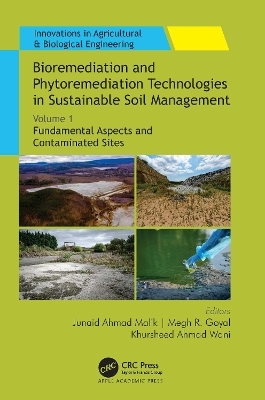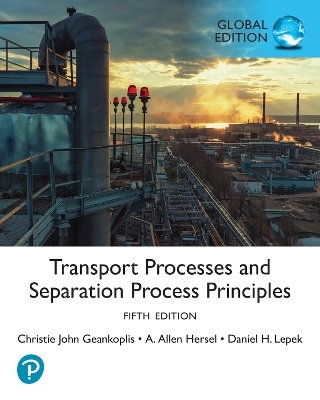
Bioremediation and Phytoremediation Technologies in Sustainable Soil Management
Apple Academic Press Inc. (Verlag)
978-1-77463-958-0 (ISBN)
This 4-volume set focuses on the use of microbial bioremediation and phytoremediation to clean up pollutants in soil, such as pesticides, petroleum hydrocarbons, metals, and chlorinated solvents, which reduce the soil's fertility and renders it unfit for plant growth.
Volume 1: Fundamental Aspects and Contaminated Sites begins with an overview of phytoremediation and the role of environmental factors. It goes on to introduce soil assessment techniques and offers methods of remediation designed to combat soil and agricultural degradation. It discusses soils contaminated by heavy metals; microbial and phytoremediation-based removal of polycyclic aromatic hydrocarbons (PAHs) from coal, crude oil, and gasoline; microbial bioremediation and amelioration of pesticide-contaminated soils; phytoremediation techniques for biomedical waste contaminated sites; as well as biomediation processes for human waste sites. Biopesticides are also explained as an alternative to conventional pesticides.
Other volumes in the 4-volume set:
• Volume 2: Microbial Approaches and Recent Trends
• Volume 3: Inventive Techniques, Research Methods, and Case Studies
• Volume 4: Degradation of Pesticides and Polychlorinated Biphenyls
Together, these four volumes provide in-depth coverage of the mechanisms, advantages, and disadvantages of the bioremediation and phytoremediation technologies for safe and sustainable soil management.
Junaid Ahmad Malik, PhD, is a Lecturer with the Department of Zoology at Government Degree College, Bijbehara, Kashmir (J&K), India. He has published research articles and technical papers in international journals and has authored and edited books, book chapters, and popular editorial articles. He also serves as an editor and reviewer for several journals. Megh R. Goyal, PhD, PE, is a prolific author and editor. He is a retired professor from the College of Engineering at the University of Puerto Rico. A former soil conservation inspector, Dr. Goyal was proclaimed as the “Father of Irrigation Engineering in Puerto Rico for the twentieth century” by the ASABE, Puerto Rico Section, for his pioneering work on micro irrigation, evapotranspiration, agroclimatology, and soil and water engineering. Khursheed Ahmad Wani, PhD, is a Lecturer in the Department of Environmental Science, Government Degree College, Bijbehara, J & K, India, and is actively involved in teaching and research. He was formerly Assistant Professor in the Department of Environmental Science ITM University, Gwalior, India, for more than five years. Dr. Wani has published research papers and book chapters and has edited several books. He has worked as principal investigator in research projects sanctioned by the Madhya Pradesh Council of Science and Technology.
PART 1: FUNDAMENTAL ASPECTS 1. Phytoremediation and Phytotechnologies: An Overview 2. Phytoremediation and Environmental Factors PART 2: TECHNOLOGICAL ASSESSMENT 3. Role of Phytoremediation to CleanUp Heavy Metal Polluted Soils 4. Phytoremediation Technique for PAH-Polluted Soils: Applications, Challenges, and Opportunities 5. Assessment and Overview of Petroleum Hydrocarbon Bioremediation PART 3: CONTAMINATED SITES AND XENOBIOTICS 6. Phytoremediation of Soils Contaminated by Heavy Metals (Mercury, Cadmium, and Lead) 7. Microbial and Phytoremediation-Based Removal of Polycyclic Aromatic Hydrocarbons (PAHs) in Soil Environments 8. Microbial Bioremediation and Amelioration of Pesticide-Contaminated Soils 9. Bioremediation of Petroleum Contaminated Soils 10. Phytoremediation of Biomedical Waste Contaminated Sites 11. Bioremediation of Waste Dumping Sites
| Erscheinungsdatum | 03.05.2022 |
|---|---|
| Reihe/Serie | Innovations in Agricultural & Biological Engineering |
| Zusatzinfo | 17 Tables, black and white; 10 Line drawings, color; 16 Line drawings, black and white; 1 Halftones, color; 4 Halftones, black and white; 11 Illustrations, color; 20 Illustrations, black and white |
| Verlagsort | Oakville |
| Sprache | englisch |
| Maße | 156 x 234 mm |
| Gewicht | 648 g |
| Themenwelt | Technik ► Umwelttechnik / Biotechnologie |
| ISBN-10 | 1-77463-958-0 / 1774639580 |
| ISBN-13 | 978-1-77463-958-0 / 9781774639580 |
| Zustand | Neuware |
| Informationen gemäß Produktsicherheitsverordnung (GPSR) | |
| Haben Sie eine Frage zum Produkt? |
aus dem Bereich


